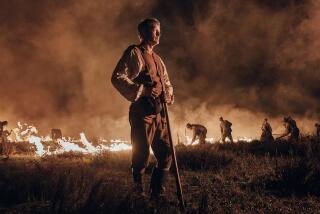MOVIE REVIEW : ‘The Promise’: Love and the Berlin Wall
Margarethe von Trotta’s beautiful, stirring love story “The Promise” reveals, through the lives of one young couple, the profound impact the Berlin Wall had on all Germans, East and West alike. It is a splendid example of classic screen storytelling by a renowned international filmmaker, a work of strength and simplicity that illuminates with flawless craftsmanship many complex issues and contradictions. Epic in scale, spanning the entire 28-year existence of the Wall, it is at once romantic and political yet ultimately personal.
In the fall of 1961, by prearranged signal, five young East Berliners, three men and two women, leave a dance floor as Bill Haley’s “Rock Around the Clock” is blasting away and head swiftly for a dark street where they disappear beneath a manhole cover. A loose shoelace causes one young man, Konrad, to stop for a second, just long enough for troops to swoop down on him. The other four make their way through the sewer to the safety of West Berlin, where Konrad’s lover Sophie leads her friends to the home of her aunt, a successful fashion designer.
*
Now on different sides of the Wall, Konrad and Sophie will soon learn the huge toll that it will exact of their lives as it does for so many other Germans. While Sophie can start working for her aunt as a model and designer, Konrad finds himself instantly at the mercy of the East German government, which his father tries to appease by claiming his son tried to talk his friends out of their flight.
To clear himself Konrad must immediately enter military service--as a border guard--prior to commencing his higher education, where he will emerge as a brilliant, ground-breaking astrophysicist.
“The Promise” is primarily more Konrad’s and East Germany’s story. It is that of a man marked permanently by his association with that escape. He sees his only way out a zealous pursuit of career, which in fact does yield him a more comfortable material existence than most East Berliners enjoy. Yet it is no more than a gilded cage as he is under constant surveillance and cannot leave the country until he’s allowed to attend a scientific congress in Prague, but wouldn’t you know that it would be 1968 and that Konrad and Sophie reunite just as the Soviet tanks roll in?
It is the mark of Von Trotta and her co-writers’ skill and perspective that the timing of this reunion doesn’t seem like piling it on their star-crossed lovers but rather as one of the more major incidents in a relentless, systematic repression on the part of the Eastern bloc geared to snuffing out all personal freedom.
Beyond this, Von Trotta does not paint the West as an earthly paradise and from the outset she makes clear, that as soundly as she condemns the Soviets, she never loses sight that the Wall is a cruel legacy of a war started by the Germans themselves.
Furthermore, she allows Sophie to insist that when all is said and done that Konrad must ultimately take responsibility for choosing to remain in the East--his growing international professional stature could conceivably create viable opportunities for flight--yet wisely does not judge him herself.
*
In thinking of everything--much, much more in regard to the Wall and its devastating, ironic and profound emotional and psychological effects--Von Trotta is able to move on to show us, post-Prague Spring, Sophie and Konrad going about creating separate lives for themselves yet always in the shadow of the Wall and a love that endures despite them both yielding to other priorities. (Sophie, after all, could return to East Germany, though at great price.)
A handsomely designed film with a suitably romantic score, “The Promise” abounds in full-bodied portrayals, starting with Anian Zollner and August Zirner, who play the younger and older Konrad, and Meret Becker and Corinna Harfouch, who play the younger and older Sophie.
In support are such major German actors as Otto Sander as Konrad’s professor, a representative of the Socialist ideal betrayed by East German corruption and totalitarianism; Tina Engel, for once getting to look glamorous as Sophie’s staunch aunt; and Hark Bohm, as an especially repellent Stasi agent. Eva Mattes plays Konrad’s activist aunt, and Hans Kremer her idealistic husband.
For all its specificity, “The Promise” tells a universal story of separation and oppression, of love and loss.
* MPAA rating: R, for a scene of sex, and for language. Times guidelines: The love scene--not a sex scene--and the language, which is minimal, should not rule out this film for mature adolescents.
(BEGIN TEXT OF INFOBOX / INFOGRAPHIC)
‘The Promise’ (‘Das Vesprachen’)
Corinna Harfouch: Sophie
Meret Becker: Sophie as a young woman
August Zirner: Konrad
Anian Zollner: Konrad as a young man
A Fine Line Features release. Director Margarethe von Trotta. Producer Eberhard Junkersdorf. Screenplay by Peter Schneider, Von Trotta in cooperation with Felice Laudadio. Cinematographer Franz Rath. Editor Suzanne Baron. Costumes Petra Kray, Yoshio Yabara. Music Christian Moldt. Set construction Benedikt Herforth. In German with English subtitles. Running time: 1 hour, 55 minutes.
* Exclusively at the Monica 4-Plex, 1332 2nd St., Santa Monica, (310) 394-9741.
More to Read
Only good movies
Get the Indie Focus newsletter, Mark Olsen's weekly guide to the world of cinema.
You may occasionally receive promotional content from the Los Angeles Times.










